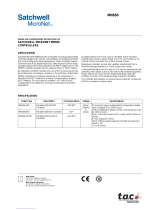Lennox RH Sensor Kit - L Connection® Network (17M50) Installation guide
- Type
- Installation guide
This manual is also suitable for
Lennox RH Sensor Kit - L Connection® Network (17M50) is a device designed to monitor and control condenser reheat for Humiditrol® units or supermarket reheat applications. It can also be used with the BC1-1 Building Controller for L Connection network applications.
The sensor can be either wall-mounted or duct-mounted. For wall-mount installation, it should be placed in a conditioned space approximately 5 feet (1-1/2m) above the floor in an area with good air circulation at average temperature. For duct-mount installation, it should be placed in the return air duct at least 6 feet (1.88m) away from the unit.
Lennox RH Sensor Kit - L Connection® Network (17M50) is a device designed to monitor and control condenser reheat for Humiditrol® units or supermarket reheat applications. It can also be used with the BC1-1 Building Controller for L Connection network applications.
The sensor can be either wall-mounted or duct-mounted. For wall-mount installation, it should be placed in a conditioned space approximately 5 feet (1-1/2m) above the floor in an area with good air circulation at average temperature. For duct-mount installation, it should be placed in the return air duct at least 6 feet (1.88m) away from the unit.




-
 1
1
-
 2
2
-
 3
3
-
 4
4
Lennox RH Sensor Kit - L Connection® Network (17M50) Installation guide
- Type
- Installation guide
- This manual is also suitable for
Lennox RH Sensor Kit - L Connection® Network (17M50) is a device designed to monitor and control condenser reheat for Humiditrol® units or supermarket reheat applications. It can also be used with the BC1-1 Building Controller for L Connection network applications.
The sensor can be either wall-mounted or duct-mounted. For wall-mount installation, it should be placed in a conditioned space approximately 5 feet (1-1/2m) above the floor in an area with good air circulation at average temperature. For duct-mount installation, it should be placed in the return air duct at least 6 feet (1.88m) away from the unit.
Ask a question and I''ll find the answer in the document
Finding information in a document is now easier with AI
Related papers
-
Lennox SGH & SCH 036-240 (3, 5, 10, 20 ton) Strategos Installation guide
-
Lennox LGH/LCH156-300 C Box Installation guide
-
Lennox Zone Link (ZL) - L Connection® Network (11W27) Installation guide
-
Lennox 24C58 User manual
-
Lennox 0624-L5 User manual
-
Lennox Prodigy® 2.0 (M3 Unit Controller) Installation guide
-
Lennox PRODIGY M2 Installation & Setup Manual
-
Lennox LC1077 Sustainable Rooftop Units User guide
-
Lennox LCH 048 Installation Instructions Manual
-
Lennox ComfortSense 8500 (CS8500) Commercial Thermostats - C0SNAJ03FF2L (17G75) and C0SNAJ22FF2L (17G76) (Non-Zoning) Installation guide
Other documents
-
Trane VariTrac VAV-SVN03A-EN Installation guide
-
Trane 3VAV-PRC003-EN User manual
-
Trane VariTrac Dampers Catalogue
-
 Satchwell MN650 Series Installation Instructions Manual
Satchwell MN650 Series Installation Instructions Manual
-
Trane Round In/Round Out Installation and Maintenance Manual
-
Bryant Preferred Series Installation Instructions Manual
-
Liebert Mini-Mate2 MCD35A User manual
-
Carrier 48TC**16 User manual
-
Trane Tracer Summit Hardware And Software Installation Manual
-
Trane VAV VV550 LonTalk Installation & Operation Manual




